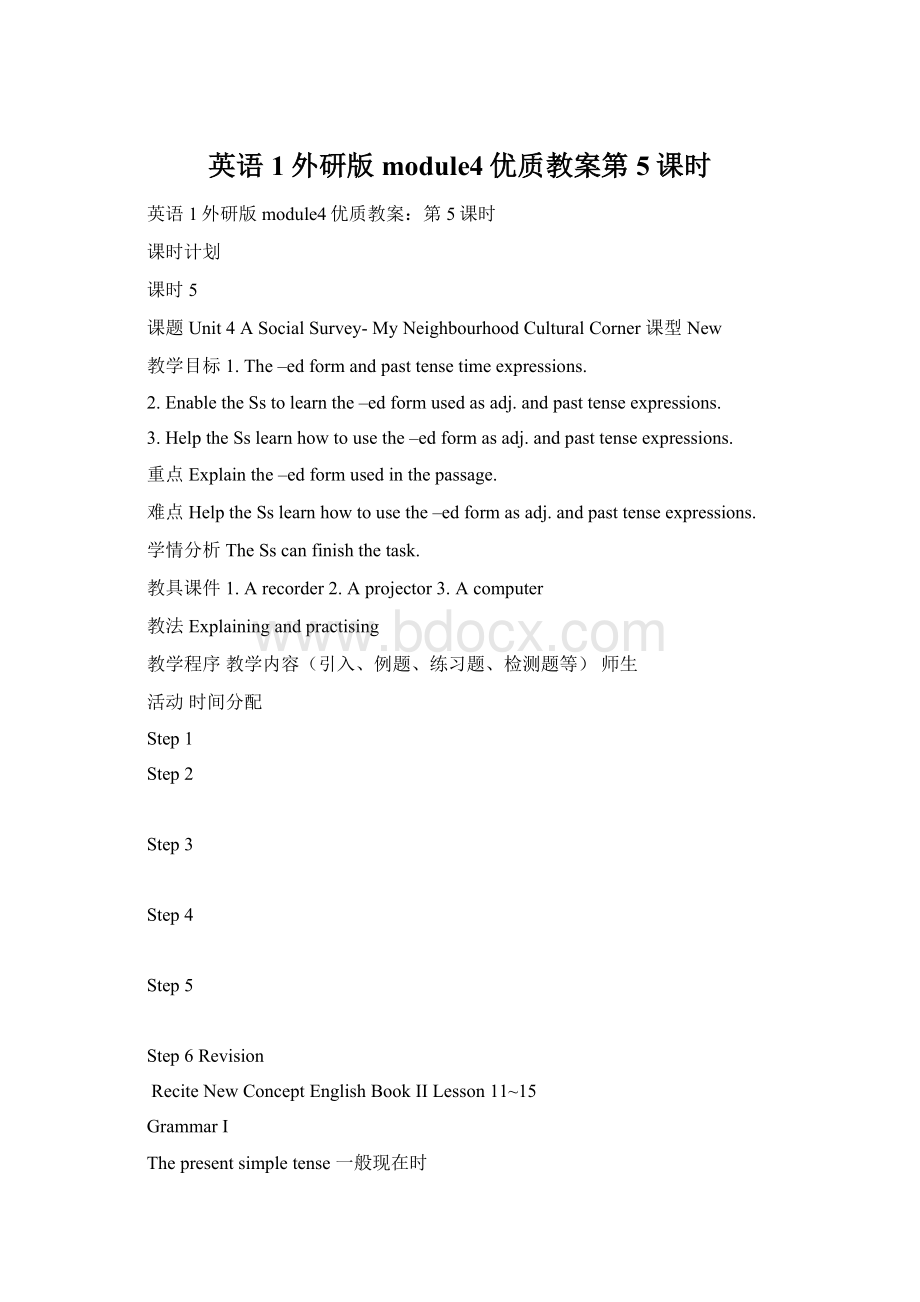英语1外研版module4优质教案第5课时.docx
《英语1外研版module4优质教案第5课时.docx》由会员分享,可在线阅读,更多相关《英语1外研版module4优质教案第5课时.docx(7页珍藏版)》请在冰豆网上搜索。

英语1外研版module4优质教案第5课时
英语1外研版module4优质教案:
第5课时
课时计划
课时5
课题Unit4ASocialSurvey-MyNeighbourhoodCulturalCorner课型New
教学目标1.The–edformandpasttensetimeexpressions.
2.EnabletheSstolearnthe–edformusedasadj.andpasttenseexpressions.
3.HelptheSslearnhowtousethe–edformasadj.andpasttenseexpressions.
重点Explainthe–edformusedinthepassage.
难点HelptheSslearnhowtousethe–edformasadj.andpasttenseexpressions.
学情分析TheSscanfinishthetask.
教具课件1.Arecorder2.Aprojector3.Acomputer
教法Explainingandpractising
教学程序教学内容(引入、例题、练习题、检测题等)师生
活动时间分配
Step1
Step2
Step3
Step4
Step5
Step6Revision
ReciteNewConceptEnglishBookIILesson11~15
GrammarI
Thepresentsimpletense一般现在时
1.一般现在时用来表示习惯性动作,常和某些副词或副词短语连用,如:
always,never,occasionally,often,usually,everyday,sometimes,onMondays,twiceayear等,也可与表示惯例或习惯性动作的时间从句连用。
如:
Healwaysworksatnight.
他经常在晚上工作。
IgotochurchonSundays.
我星期天去教堂做礼拜。
Wheneveritrains,theroofleaks.
只要下雨,屋顶就漏水。
2.询问或引用书籍、通知或新近接到的信件的内容时,常将一般现在时与动词say连用。
—Whatdoesthenoticesay?
—Itsays,“Noparking.”
—那通知说什么?
—通知说:
“不准停放车辆。
”
3.可用于报刊新闻等的标题。
如:
MASSMURDERERESCAPES残杀多人的凶手逃跑
PEACETALKSFALL和谈破裂
4.表示计划好的将来行动或一系列行动,特别是指旅途中的行动。
如:
WeleaveLondonat10:
00nextTuesdayandarriveinParisat13:
00.
5.表示客观事实或普遍真理。
如:
Knowledgeispower.
知识就是力量。
6.表示要发生的将来的动作,只限于go,come,leave,start,return,begin等动词。
如:
Theplanetakesoffat10:
00.
飞机10:
00起飞。
7.在连词when,before,until,if,assoonas,as等引导的表示将来行为的状语从句中,常用一般现在时代替一般将来时。
如:
I’llwaittillhecomes.
我要等到他来。
NexttimeI’lldoashesays.
下次我将按照他所说的去做。
GrammarII
Thepresentcontinuoustense
1)表示动作现在正在发生或进行。
可与now,atpresent,atthismoment,thesedays等时间状语连用,也可不用时间状语。
如:
Whatishedoingnow?
他现在在做什么?
2)表示现阶段正在进行的动作,但说话时该动作不一定正在进行。
如:
IamreadingaplaybyShaw.我正在阅读一本箫伯纳写的剧本
3) 表示反复发生的动作。
常与always,forever,constantly,allthetime,continually,simply等时间副词连用。
用来表示不满、抱怨或赞赏等情感。
如:
Sheisalwaysfindingfaultwithothers.她总是挑别人的毛病。
4)表示最近的将来已定的安排(这是用于表示眼前打算的最普通的说法。
)如:
IammeetingPetertonight.Heistakingmetothetheatres.
今天晚上我要跟彼得会面。
他要带我去看戏。
5)表示从一个地方到另一个地方的动词如arrive,come,drive,fly,go,leave,start,travel;表示位置移动的动词如stay,remain和动词do和have,它们的现在进行时表示没有具体安排好细节的决定或计划。
如:
WhatareyoudoingnextSunday?
下星期六你准备做什么?
Exercises
1.Idon’treallyworkhere,I____untilthenewsecretaryarrives.
A. justhelpoutB.havejusthelpedout
C.amjusthelpingoutD.willjusthelpout
2.—Doyoulikethematerial?
—Yes,it_______verysoft.
A.isfeelingB.feltC.feelsD.isfelt
3.I’vewonaholidayfortwoweekstoFlorida.I_______mymum.
A.amtakingB.havetakenC.takeD.willhavetaken
4.—Whenwillyoucometoseeme,Dad?
—Iwillgotoseeyouwhenyou______thetrainingcourse.
A.willhavefinishedB.willfinishC. arefinishingD.finish
5.Healways______carefulnoteswhileheislisteningtotheteacherinclass.
A.willtakeB.tookC.takesD.istaking
6.I’msorryIcan’tgo.I____areport.
A.writeB.amwritingC.wroteD.waswriting
7.—What’stheterriblenoise?
─Theneighbors______foraparty.
A. havepreparedB.arepreparingC.prepareD.willprepare
8.Ineedonemorestampbeforemycollection_____.
A. hascompletedB.completeC.hasbeencompletedD.iscompleted
9.─CanIjointheclub,Dad?
─Youcanwhenyou______abitolder.
A. getB.willgetC.aregettingD.willhavegot
10.There_______thebus.Hurryup.
A.iscomingB.comesC.hascomeD.willcome
11.IfI______whenhecomes,wakemeup,please.
A.sleptB.amsleepingC.willbesleepingD.wassleeping
12.He_______tounderstandthathedidwrongtohissister.
A.isbeginningB.beginC.hasbeenbegunD.willbegin
13.Georgehasarrived,butIdidnotknowhe______untilyesterday.
A.comeB.willcomeC.iscomingD.wascoming
14.Tomknowsthathisuncle_____nofewerthantenhouses,andallofthemareletatveryhighrents.
A.isowningB.ownsC.ownedD.wasowning
15.Willyoupostthisletterifyou_____apost-box?
A.willbepassingB.arepassingC.havepassedD.werepassing
GrammarIII
PastTenseTimeExpressions
1.常用的表示过去的时间状语有:
recently,duringtheday,onenight,alongtimeago,untilthe1920s,in1925,formanyyears,justnow,atthattime,duringhismiddleschoolyears,then,lastnight/year/week/month,aweek/month/yearago,intheolddays…
2.表示过去的习惯性、重复性的动作,常用一定的时间状语或频度状语,如:
IplayedfootballeveryweekwhenIwasyoung.
Iusedtogoshoppingduringweekdays.
Exercises
将以下句子译成英语:
1.上周末,简吃了一顿由外婆做的好饭。
Lastweekend,Janeateanicemeal(whichwas)cookedbyhergrandmother.
2.昨天晚上,她完成作业后就上床睡觉了。
Shewenttobedaftershefinishedherhomeworklastnight.
3.前几天,Robert去北京出差了。
RobertwenttoBeijingonbusinesstheotherday.
4.玛丽过去一周来拜访我一次。
Maryusedtopayavisitto/visitmeonceaweek.
Homework
EnglishWeekly
Learn&doexx
Learn&doexx
10’
24’
27’
10’
1’
板书Unit4ASocialSurvey-MyNeighbourhood
The5thPeriod
Grammar
1.Thepresentsimpletense一般现在时
1)一般现在时用来表示习惯性动作,常和某些副词或副词短语连用,如:
always,never,occasionally,often,usually,everyday,sometimes,onMondays,twiceayear等,也可与表示惯例或习惯性动作的时间从句连用。
Healwaysworksatnight.他经常在晚上工作。
2)询问或引用书籍、通知或新近接到的信件的内容时,常将一般现在时与动词say连用。
Thenoticesays,“Noparking.”—通知说:
“不准停放车辆。
”
3)可用于报刊新闻等的标题。
如:
MASSMURDERERESCAPES残杀多人的凶手逃跑
4)表示计划好的将来行动或一系列行动,特别是指旅途中的行动。
如:
WeleaveLondonat10:
00nextTuesdayandarriveinParisat13:
00.
5)表示客观事实或普遍真理。
如:
Knowledgeispower.知识就是力量。
6.表示要发生的将来的动作,只限于go,come,leave,start,return,begin等动词。
如:
Theplanetakesoffat10:
00.飞机10:
00起飞。
7.在连词when,before,until,if,assoonas,as等引导的表示将来行为的状语从句中,常用一般现在时代替一般将来时。
如:
I’llwaittillhecomes.我要等到他来。
2.Thepresentcontinuoustense
1)表示动作现在正在发生或进行。
可与now,atpresent,atthismoment,thesedays等时间状语连用,也可不用时间状语。
如:
Whatishedoingnow?
他现在在做什么?
2)表示现阶段正在进行的动作,但说话时该动作不一定正在进行。
如:
IamreadingaplaybyShaw.我正在阅读一本箫伯纳写的剧本
3) 表示反复发生的动作。
常与always,forever,constantly,allthetime,continually,simply等时间副词连用。
用来表示不满、抱怨或赞赏等情感。
如:
Sheisalwaysfindingfaultwithothers.她总是挑别人的毛病。
4)表示最近的将来已定的安排(这是用于表示眼前打算的最普通的说法。
)如:
IammeetingPetertonight.Heistakingmetothetheatres.今天晚上我要跟彼得会面。
他要带我去看戏。
5)表示从一个地方到另一个地方的动词如arrive,come,drive,fly,go,leave,start,travel;表示位置移动的动词如stay,remain和动词do和have,它们的现在进行时表示没有具体安排好细节的决定或计划。
如:
WhatareyoudoingnextSunday?
下星期六你准备做什么?
3.PastTenseTimeExpressions
1)常用的表示过去的时间状语有:
recently,duringtheday,onenight,alongtimeago,untilthe1920s,in1925,formanyyears,justnow,atthattime,duringhismiddleschoolyears,then,lastnight/year/week/month,aweek/month/yearago,intheolddays…
2)表示过去的习惯性、重复性的动作,常用一定的时间状语或频度状语,如:
教学后记Someoftheexercisescannotbewellunderstood.